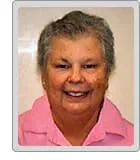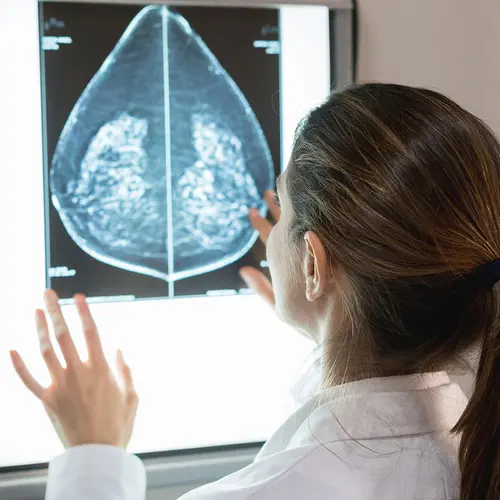
Breast cancer survivor Diane Morgan, 71, lives in Santa Rosa, Calif. now. But her breast cancer story began in 2005, when she was 67 and and living near Miami in Sunny Isles, Fla. That's one of the places where Hurricane Katrina struck before devastating New Orleans. The night of the storm, Morgan used towels to mop up water Katrina sent through her windows. While dumping the wet towels in her bathtub, she slipped, fell, and hit her side on the bathroom doorknob.
In the weeks that followed, her breast on that side still ached, and she figured that was from her fall. She was due for a mammogram, but more storms had followed Katrina, pushing her mammogram appointment back until the end of November.
Morgan says her doctors thought she had a bruised breast, and the breast was swollen, which Morgan chalked up to her fall. But they did a biopsy to be sure.
"I was not prepared when they called me back later and said, 'Sorry, but you've got breast cancer.' It sucked the air right out of me. I about hit the floor. This has got to be a mistake -- I've just got a bruise," she says.
But it wasn't a bruise from the fall. It was inflammatory breast cancer, a rare and aggressive type of breast cancer.
Her treatment: Morgan got treatment for her inflammatory breast cancer at the Sylvester Comprehensive Cancer Center at the University of Miami Miller School of Medicine.
"My attitude with doctors is, tell me what I need to know but don't elaborate," Morgan says. "I'm not one of these people who wants to know all the details, because I think you could freak yourself out."
First came chemotherapy to shrink her tumor. "I started on Valentine's Day 2006. That was a very memorable Valentine's Day," Morgan says. "They gave me steroids, and I had this red face all swollen up, and this red boob, and I'm like, I'm the valentine from hell."
But the chemotherapy was successful, and next, Morgan had surgery to remove her right breast. "Definitely, something had to be done," Morgan says, noting that her surgical treatment was clear cut. "They told me, this is what we've got to do. There was no agonizing over options."
Morgan worried most about lymphedema, which is fluid build-up that causes swelling. It can be a side effect of breast cancer surgery to remove lymph nodes.
Morgan had seen two of her cousins suffer from "terribly swollen arms" from lymphedema after breast cancer treatment in the 1990s.
"All I could think of is if I'm going to have surgery that leaves me like that, forget it," she says. But her doctor assured her that surgical techniques had improved since her cousins were treated. Lymphedema can still occur, but it didn't happen to Morgan.
After her mastectomy, Morgan got seven weeks of radiation therapy. And throughout her treatment, she talked often with her sister, who had had a different type of breast cancer in the mid-1990s.
"The one thing that I marvel at is that her treatment was so severe compared to mine, and it just shows you, within a 10-year period or so, the great progress they've made," Morgan says.
No reconstruction: Morgan chose not to undergo breast reconstruction.
"I was not really into that," she says. "They did ask me and I didn't want to have any more surgery... the lopsidedness didn't bother me much at this stage of my life, and it still doesn't, really."
"I do have what I call my fancy falsie silicone prostheses," she says. "Once or twice I've worn a sports bra with the falsie in it, but it just doesn't bother me that much, and I tend to wear T-shirts and clothing that kind of disguises the fact that I am lopsided. But fortunately, there's no pain involved, and once in a while I get kind of stiff on that side, but other than that, they did a wonderful job of not hampering me in any way. I was very pleased with the way that turned out."
"A breast is not a vital organ. You can live without it."
Consoling her friends: Morgan's friends tried to offer support. But their attempts sometimes went awry. Some cried, others blurted out about people they knew who'd died of breast cancer. And sometimes, Morgan would have to turn the tables and comfort them.
"I'd be cheering them up, saying, 'I don't feel that bad yet. I don't think I'm dying here,'" Morgan says. "People mean so well. These are dear friends I've known for decades... but they were just fouling up."
Her advice to people who have a loved one going through breast cancer: "Call them up and be cheerful," Morgan says. "The person going through this thing wants to talk about something else. You want to be able to have some positive things and you want a break from the stress of the whole thing. So let the conversation go where it may."
Some of the cards she received didn't go over well.
"I didn't appreciate getting a lot of prayerful, serious illness cards. If it was my choice, I'd tell Hallmark to dump all those," Morgan says. "I'd say, 'Draw me a happy face on a piece of paper and send it to me. But don't send me, 'We're praying for you and may God be with you and all that kind of stuff, because that just supported the thought that I was in really big trouble and I was going to die. I was thinking positive."
New lease on life: "My theory is the doctors at Sylvester gave me an extension on my life, and I want to make the most of it," Morgan says.
Now retired, she lives in a seniors' community in Santa Rosa, Calif., near her two sisters. She's spent most of her life in the area, before moving to the Miami area in her 50s to work in the hotel industry.
Morgan says she has a "nice social life" in her community and recently attended the beach wedding of a friend's son. "These are good days that I wouldn't have had," Morgan says. "Any day without a doctor's appointment, I figure, is a good day. This is a day I could enjoy. This is my day. You learn to take it one day at a time," Morgan says. "This is a gift of life."
Share your breast cancer stories on WebMD's breast cancer message board.

